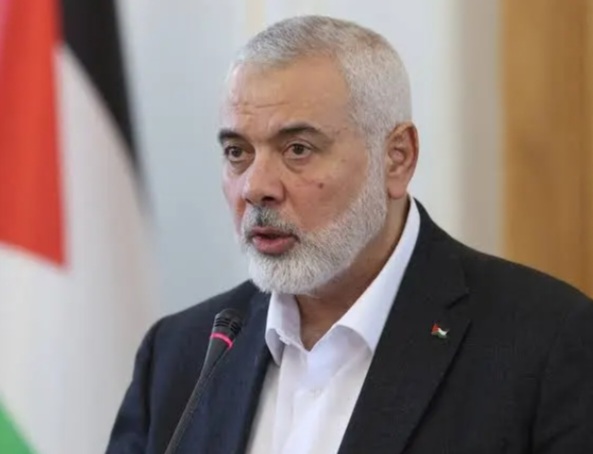
Hamas leader Ismail Haniyeh was assassinated in the early hours of the morning in Iran, the Palestinian militant group said on Wednesday, drawing fears of a wider escalation in a region shaken by Israel’s war in Gaza and a worsening conflict in Lebanon.
Recall that three of Haniyeh’s sons – Hazem, Amir and Mohammad – were killed on April 10 when an Israeli air strike struck the car they were driving, Hamas said. Haniyeh also lost four of his grandchildren, three girls and a boy, in the attack, Hamas said.
Iran’s Revolutionary Guards confirmed the death of Haniyeh, hours after he attended a swearing-in ceremony for the country’s new president, and said it was investigating.
There was no immediate comment from Israel.
The Israeli military said it was conducting a situational assessment but had not issued any new security guidelines for civilians.
U.S. Defense Secretary Lloyd Austin said Washington would work to try to ease tensions but affirmed the United States would help defend Israel if it were attacked.
The news, which came less than 24 hours after Israel claimed to have killed the Hezbollah commander it said was behind a deadly strike in the Israeli-occupied Golan Heights, appears to set back chances of any imminent ceasefire agreement in Gaza.
“This assassination by the Israeli occupation of Brother Haniyeh is a grave escalation that aims to break the will of Hamas,” senior Hamas official Sami Abu Zuhri told Reuters.
He said Hamas, the Palestinian Islamist group that ruled Gaza, would continue the path it was following, adding: “We are confident of victory.”
Iran’s top security body is expected to meet to decide Iran’s strategy in reaction to the death of Haniyeh, a close ally of Tehran, said a source with knowledge of the meeting.
Palestinian President Mahmoud Abbas condemned the killing of Haniyeh and Palestinian factions in the occupied West Bank called for a general strike and mass demonstrations
Haniyeh, normally based in Qatar, has been the face of the Palestinian group’s international diplomacy as the war set off by the Hamas-led attack on Israel on Oct. 7 has raged in Gaza, where three of his sons were killed in an Israeli airstrike.
The International Criminal Court prosecutor’s office requested an arrest warrant for him over alleged war crimes at the same time it issued a similar request against Israeli Prime Minister Benjamin Netanyahu.
Appointed to the Hamas top job in 2017, Haniyeh has moved between Turkey and Qatar’s capital Doha, escaping the travel curbs of the blockaded Gaza Strip and enabling him to act as a negotiator in ceasefire talks or to talk to Hamas’ ally Iran.
The assassination of Haniyeh comes as Israel’s campaign in Gaza approaches the end of its 10th month with no sign of an end to a conflict that has shaken the Middle East and threatened to spiral into a wider regional conflict.
Despite anger at Netanyau’s government from families of the Israeli hostages still held in Gaza and mounting international pressure for a ceasefire, talks brokered by Egypt and Qatar appear to have faltered.
At the same time, the risk of a war between Israel and Hezbollah has grown following the strike in the Golan Heights that killed 12 children in a Druze village on Saturday and the subsequent killing of the senior Hezbollah commander Fuad Shukr.
The war started on Oct. 7 when Hamas-led fighters broke through security barriers around Gaza and launched a devastating attack on Israeli communities nearby, killing 1,200 people and abducting some 250 hostages in Gaza.
In response, Israel launched a relentless ground and air offensive in the densely populated coastal enclave that has killed more than 39,000 people and left more than 2 million facing a severe humanitarian crisis.
● By Reuters/NAN


